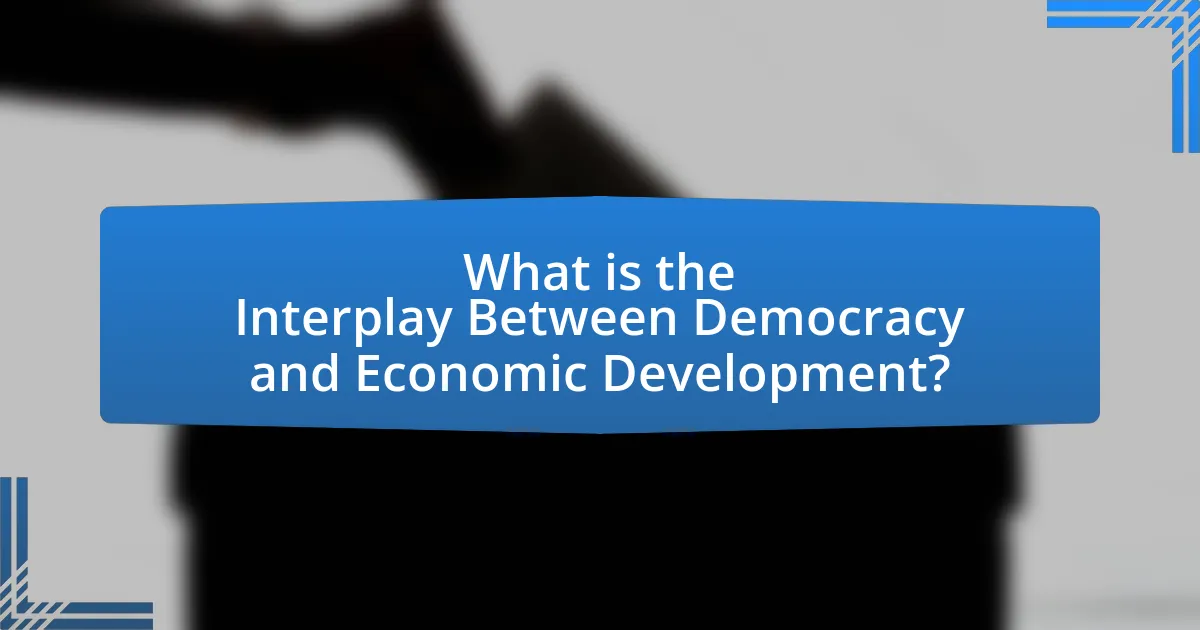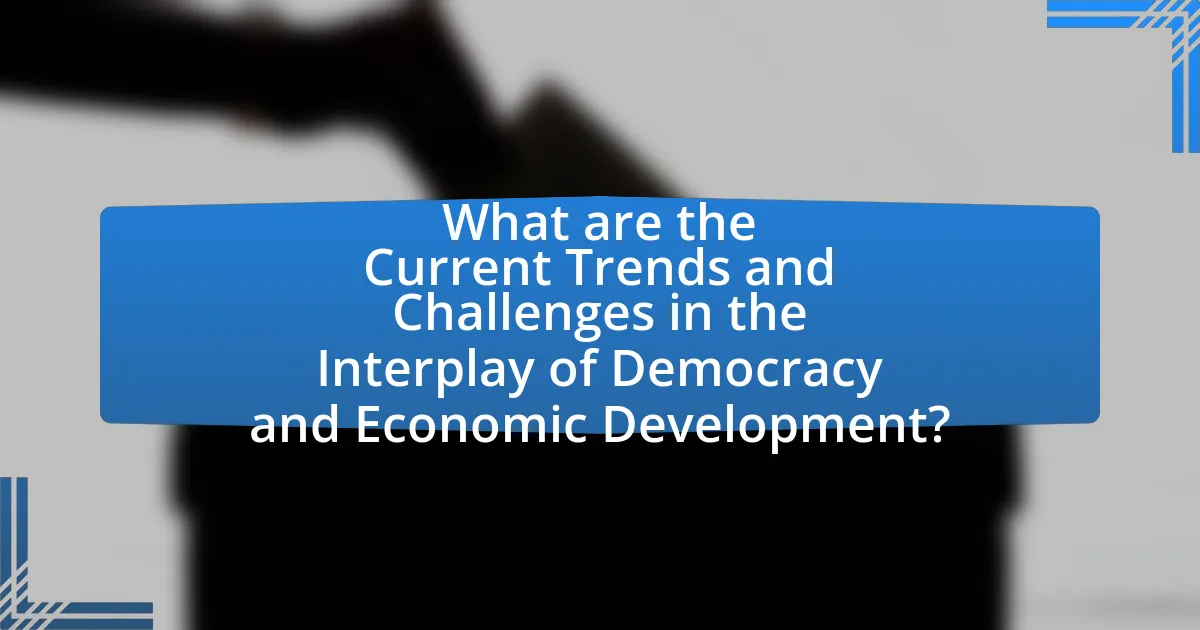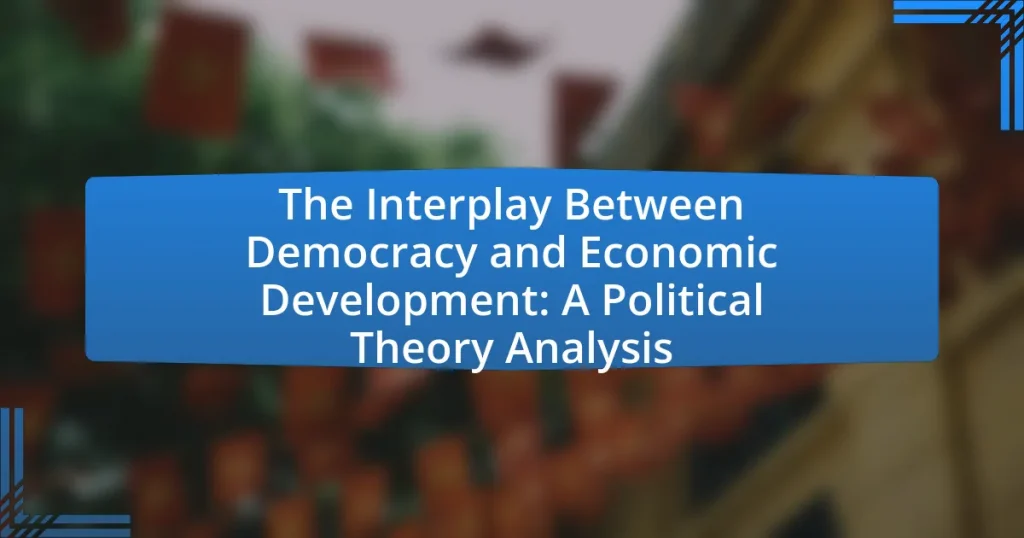The article examines the complex relationship between democracy and economic development, highlighting how democratic governance can promote economic growth while economic development can enhance democratic stability. It discusses mechanisms through which these two entities influence each other, such as governance, accountability, and social stability, and provides historical examples like post-World War II Western Europe and South Korea’s economic rise. The article also explores the impact of political institutions on economic performance, the implications for developing countries, and the challenges posed by current trends like populism and inequality. Additionally, it outlines strategies for policymakers to leverage democratic principles to foster economic outcomes and emphasizes the role of civil society in supporting this interplay.

What is the Interplay Between Democracy and Economic Development?
The interplay between democracy and economic development is characterized by a reciprocal relationship where democratic governance can foster economic growth, while economic development can enhance democratic stability. Democratic institutions promote transparency, accountability, and participation, which are essential for creating an environment conducive to investment and innovation. For instance, countries with democratic systems, such as those in Scandinavia, often exhibit higher levels of economic performance due to effective governance and social welfare policies. Conversely, economic development can strengthen democracy by creating a middle class that demands political rights and accountability, as seen in the economic rise of nations like South Korea. This dynamic illustrates that while democracy can drive economic progress, economic growth can also reinforce democratic structures, creating a cycle of mutual reinforcement.
How do democracy and economic development influence each other?
Democracy and economic development mutually influence each other through mechanisms such as governance, accountability, and social stability. Democratic systems tend to promote transparency and accountability, which can lead to better economic policies and resource allocation. For instance, countries with higher levels of democracy, such as Norway and Sweden, often experience robust economic growth due to effective governance and public trust in institutions. Conversely, economic development can enhance democratic practices by fostering a middle class that demands political participation and accountability, as seen in the case of South Korea’s transition to democracy following rapid economic growth in the late 20th century. This reciprocal relationship highlights how democratic governance can create an environment conducive to economic prosperity, while economic development can strengthen democratic institutions.
What historical examples illustrate the relationship between democracy and economic growth?
Historical examples illustrating the relationship between democracy and economic growth include the post-World War II economic expansion in Western Europe and the rapid growth of South Korea from the 1960s onward. In Western Europe, countries like Germany and France experienced significant economic recovery and growth due to democratic governance, which fostered stable institutions, investment, and trade. The Marshall Plan, implemented in 1948, provided financial aid that, combined with democratic reforms, led to an average annual growth rate of about 5% in the region during the 1950s and 1960s.
Similarly, South Korea transitioned to a democratic government in the late 1980s, which coincided with substantial economic growth. The country implemented policies that promoted education, technology, and export-oriented industries, resulting in an average GDP growth rate of over 7% annually from the 1960s to the 1990s. This growth was supported by democratic institutions that encouraged innovation and accountability. These examples demonstrate that democracy can create an environment conducive to economic growth through stable governance and effective policy implementation.
How do political institutions affect economic performance in democratic contexts?
Political institutions significantly influence economic performance in democratic contexts by shaping policy stability, regulatory frameworks, and the protection of property rights. Stable political institutions foster an environment conducive to investment and economic growth, as evidenced by the correlation between strong democratic governance and higher GDP per capita in countries like Sweden and Canada. Furthermore, effective political institutions enhance accountability and transparency, reducing corruption, which in turn positively impacts economic performance. Research by Acemoglu and Robinson in “Why Nations Fail” highlights that inclusive political institutions lead to better economic outcomes by ensuring that a broader segment of the population has a stake in economic prosperity.
Why is understanding this interplay important for policymakers?
Understanding the interplay between democracy and economic development is crucial for policymakers because it informs effective governance and sustainable growth strategies. Policymakers who grasp this relationship can design policies that promote democratic institutions while simultaneously fostering economic progress, leading to enhanced social stability and citizen engagement. Research indicates that countries with strong democratic frameworks tend to experience higher levels of economic development, as seen in the correlation between democratic governance and GDP growth rates in various nations. This understanding enables policymakers to create environments that attract investment, encourage innovation, and improve public welfare, ultimately resulting in a more resilient and prosperous society.
What implications does this relationship have for developing countries?
The relationship between democracy and economic development has significant implications for developing countries, primarily influencing governance, economic policies, and social equity. Democratic governance often leads to more transparent and accountable institutions, which can enhance economic stability and attract foreign investment. For instance, countries like India and Brazil have experienced economic growth alongside democratic reforms, demonstrating that political freedoms can foster an environment conducive to economic opportunities. Furthermore, democracies tend to prioritize social equity, which can reduce poverty and improve access to education and healthcare, as seen in various African nations that have embraced democratic practices. These factors collectively contribute to sustainable development and improved quality of life in developing countries.
How can policymakers leverage democratic principles to enhance economic outcomes?
Policymakers can leverage democratic principles by promoting transparency, accountability, and citizen participation to enhance economic outcomes. Transparency in government operations fosters trust and encourages investment, as seen in countries like Sweden, where open data initiatives have led to increased foreign direct investment. Accountability mechanisms, such as independent audits and anti-corruption measures, ensure that public resources are used efficiently, which is evidenced by Singapore’s economic success attributed to strict governance practices. Additionally, fostering citizen participation in decision-making processes can lead to policies that better reflect the needs of the population, as demonstrated in participatory budgeting initiatives in Brazil, which have improved local economic conditions. These democratic principles create an environment conducive to sustainable economic growth.

What are the Theoretical Frameworks Surrounding Democracy and Economic Development?
Theoretical frameworks surrounding democracy and economic development include modernization theory, dependency theory, and institutionalism. Modernization theory posits that economic development leads to democratization, suggesting that as societies become wealthier, they adopt democratic governance. This is supported by empirical evidence showing that wealthier nations tend to have more democratic institutions. Dependency theory, on the other hand, argues that economic development in poorer nations is hindered by their dependence on wealthier nations, which can perpetuate authoritarian regimes. Lastly, institutionalism emphasizes the role of political institutions in shaping economic outcomes, asserting that strong democratic institutions can foster economic growth by promoting stability and accountability. These frameworks provide a comprehensive understanding of the complex relationship between democracy and economic development.
What political theories explain the relationship between democracy and economic growth?
Political theories explaining the relationship between democracy and economic growth include modernization theory, which posits that democratic governance fosters economic development by promoting political stability and encouraging investment. Additionally, the institutional theory suggests that democracies create better economic policies through accountability and transparency, leading to sustainable growth. Empirical evidence supports these theories; for instance, a study by Acemoglu, Johnson, and Robinson (2001) demonstrates that countries with inclusive political institutions experience higher economic growth rates compared to those with extractive institutions. Furthermore, the social capital theory indicates that democracies enhance social trust and cooperation, which are essential for economic transactions and development.
How does modernization theory relate to democracy and economic development?
Modernization theory posits that economic development leads to the emergence and consolidation of democracy. This theory suggests that as societies industrialize and modernize, they undergo social changes that promote democratic governance, such as increased education, urbanization, and the rise of a middle class. Empirical evidence supports this relationship; for instance, countries like South Korea and Taiwan transitioned to democratic systems following significant economic growth in the late 20th century. Additionally, the World Bank has documented that higher income levels correlate with greater democratic practices, reinforcing the idea that economic development fosters democratic institutions.
What role does institutional theory play in understanding this interplay?
Institutional theory plays a crucial role in understanding the interplay between democracy and economic development by emphasizing how institutions shape political and economic behavior. This theory posits that the structures, norms, and rules established within a society influence the actions of individuals and organizations, thereby affecting governance and economic outcomes. For instance, strong democratic institutions can promote transparency and accountability, which are essential for fostering economic growth. Research by Acemoglu and Robinson in “Why Nations Fail” illustrates that inclusive political institutions lead to better economic performance by providing a framework for equitable resource distribution and innovation. Thus, institutional theory provides a lens through which the dynamics of democracy and economic development can be analyzed, highlighting the importance of institutional quality in achieving sustainable growth.
How do different political systems impact economic development?
Different political systems significantly impact economic development through their governance structures, policy-making processes, and institutional frameworks. Democratic systems often promote economic growth by fostering transparency, accountability, and participation, which can lead to better resource allocation and innovation. For instance, countries like South Korea and India have experienced substantial economic growth post-democratization, attributed to increased foreign investment and improved governance. In contrast, authoritarian regimes may prioritize stability and control over economic freedoms, which can stifle entrepreneurship and limit economic diversification, as seen in countries like Venezuela, where mismanagement has led to economic decline despite having rich natural resources. Thus, the nature of political systems directly influences economic outcomes by shaping the environment for investment, innovation, and overall economic policy.
What are the economic outcomes of authoritarian versus democratic regimes?
Authoritarian regimes often achieve rapid economic growth through centralized decision-making and the ability to implement policies without public dissent, while democratic regimes tend to foster sustainable economic development through inclusive governance and protection of property rights. For instance, countries like China have experienced significant GDP growth rates averaging around 10% annually over several decades due to state-led initiatives, whereas democratic nations like India, despite slower growth rates, have shown resilience and adaptability through market reforms and democratic accountability. Studies indicate that while authoritarian regimes may initially drive economic expansion, democracies are more likely to sustain long-term growth by promoting innovation and human capital development, as evidenced by the World Bank’s findings on governance and economic performance across various countries.
How do hybrid regimes affect economic performance compared to pure democracies?
Hybrid regimes generally exhibit lower economic performance compared to pure democracies due to factors such as political instability, lack of accountability, and reduced investor confidence. In hybrid regimes, the presence of authoritarian elements often leads to inconsistent policy implementation and corruption, which can deter foreign investment and hinder economic growth. For instance, according to the World Bank, countries classified as hybrid regimes tend to have lower GDP growth rates than those classified as full democracies, as evidenced by data from the 2020 World Governance Indicators. This indicates that the mixed political structures in hybrid regimes create an environment less conducive to sustainable economic development compared to the more stable and transparent governance found in pure democracies.

What are the Current Trends and Challenges in the Interplay of Democracy and Economic Development?
Current trends in the interplay of democracy and economic development include the rise of populism and the increasing importance of digital governance. Populism often challenges established democratic norms, leading to political instability that can hinder economic growth. For instance, countries like Hungary and Brazil have seen populist leaders undermine democratic institutions, which can deter foreign investment and disrupt economic policies.
Challenges also arise from economic inequality, which can erode democratic participation. Research indicates that high levels of inequality can lead to political disengagement, as seen in the United States, where wealth concentration has been linked to lower voter turnout. Additionally, the COVID-19 pandemic has exacerbated these issues, revealing vulnerabilities in both democratic governance and economic resilience, as governments struggle to balance public health and economic recovery.
Overall, the relationship between democracy and economic development is increasingly complex, with trends like populism and inequality posing significant challenges to sustainable growth and democratic integrity.
What recent developments have influenced the relationship between democracy and economic growth?
Recent developments influencing the relationship between democracy and economic growth include the rise of digital governance and the impact of global economic shifts. Digital governance has enhanced transparency and citizen engagement, leading to improved economic policies and growth outcomes in democratic nations. For instance, countries like Estonia have leveraged e-governance to streamline services and boost economic efficiency, resulting in significant GDP growth. Additionally, global economic shifts, such as the increasing importance of sustainable development and social equity, have prompted democracies to adopt policies that prioritize inclusive growth, further strengthening the link between democratic governance and economic performance.
How has globalization impacted democratic governance and economic policies?
Globalization has significantly influenced democratic governance and economic policies by promoting interconnectedness and economic interdependence among nations. This interconnectedness often leads to the adoption of democratic norms and practices, as countries engage with global institutions that advocate for human rights and democratic governance. For instance, the spread of information technology and social media has empowered citizens, facilitating political participation and accountability, as seen during the Arab Spring where social media played a crucial role in mobilizing protests against authoritarian regimes.
Economically, globalization has prompted countries to adopt market-oriented policies to attract foreign investment and integrate into the global economy. This shift is evident in the liberalization of trade and investment policies in many developing nations, which has led to increased economic growth but also raised concerns about inequality and the erosion of local industries. According to the World Bank, countries that embraced globalization experienced an average GDP growth rate of 4.5% compared to 2.5% for those that remained isolated.
In summary, globalization has reshaped democratic governance by fostering political engagement and has driven economic policy reforms aimed at integration into the global market, with measurable impacts on growth and development.
What challenges do emerging democracies face in achieving economic development?
Emerging democracies face significant challenges in achieving economic development, primarily due to political instability, weak institutions, and corruption. Political instability often leads to inconsistent economic policies, deterring both domestic and foreign investment. For instance, countries like Venezuela have experienced economic decline due to political turmoil, which has resulted in hyperinflation and a collapse of public services. Weak institutions hinder effective governance and the enforcement of laws, which are crucial for creating a conducive environment for economic growth. According to the World Bank, countries with strong institutions tend to have higher economic growth rates. Corruption further exacerbates these issues by diverting resources away from essential public services and infrastructure, as seen in various emerging democracies where corruption indices are high, leading to reduced investor confidence and economic stagnation.
What strategies can be employed to enhance the synergy between democracy and economic development?
To enhance the synergy between democracy and economic development, strategies such as promoting inclusive governance, ensuring transparency, and fostering civic engagement can be employed. Inclusive governance allows for diverse stakeholder participation, which can lead to policies that reflect the needs of the entire population, thereby driving economic growth. Transparency in government operations reduces corruption, which has been shown to hinder economic progress; for instance, the World Bank reports that countries with higher transparency levels experience faster economic growth. Additionally, fostering civic engagement empowers citizens to hold their governments accountable, leading to better decision-making and resource allocation, as evidenced by studies indicating that participatory budgeting can improve public service delivery and economic outcomes.
How can civil society contribute to economic development in democratic contexts?
Civil society can contribute to economic development in democratic contexts by fostering civic engagement, promoting transparency, and advocating for policies that support equitable growth. Civic engagement encourages participation in decision-making processes, which can lead to more inclusive economic policies that reflect the needs of diverse communities. For instance, organizations like the World Bank have highlighted that active civil society participation can enhance accountability and reduce corruption, thereby creating a more favorable environment for economic investment. Additionally, civil society organizations often serve as watchdogs, ensuring that government actions align with democratic principles and economic fairness, which can attract both domestic and foreign investments.
What best practices can be adopted to strengthen democratic institutions for better economic outcomes?
To strengthen democratic institutions for better economic outcomes, best practices include enhancing transparency, promoting accountability, and ensuring inclusive participation. Transparency in government processes fosters trust and reduces corruption, which can lead to improved economic performance; for instance, countries with high transparency scores, such as Denmark, often experience higher GDP per capita. Promoting accountability through independent judiciary systems and free press ensures that government actions are scrutinized, leading to more responsible governance and better economic policies. Additionally, inclusive participation, where marginalized groups have a voice in decision-making, can lead to more equitable economic growth, as evidenced by studies showing that inclusive policies can boost national productivity and innovation.
What practical insights can be drawn from the analysis of democracy and economic development?
The analysis of democracy and economic development reveals that democratic governance often leads to more sustainable economic growth. Democracies tend to promote transparency, accountability, and the rule of law, which create a favorable environment for investment and innovation. For instance, countries like South Korea and Taiwan experienced significant economic growth alongside their democratic transitions in the late 20th century, demonstrating that political freedoms can enhance economic performance. Additionally, research indicates that democratic institutions facilitate better resource allocation and reduce corruption, further contributing to economic development.


